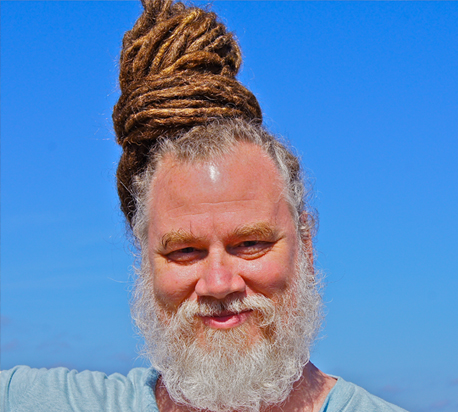Kurt ‘Kailash’ Bruder
// Author & MusicianDR. KURT ‘KAILASH’ BRUDER is an author, recording artist, communication scholar, teacher, and proponent of devotional chanting based in Ann Arbor, Michigan. Kailash’s message is that we should be choosy about what occupies our minds and hearts—the things that we’re thinking about and feeling for—because these are what we’re building our lives around. Simply put: We are what we Love. Devotional chanting is a spiritual practice that helps us select those thoughts and feelings that support us in our happiness, well-being, and evolution. Kailash’s brilliant book and CD set, “Following Sound Into Silence: Chanting Your Way Beyond Ego Into Bliss”, is available from Hay House.
Website: www.omkailash.com
Photo: Dr. Kurt ‘Kailash’ Bruder / OmKailash.com
Interview:
“ART INSPIRES US TO ‘GIVE AS BEFORE’”
When we encounter art that genuinely moves us, we are inspired to think and feel more deeply, with exceptional clarity and passion. We notice things that had escaped our attention earlier and notice them in a new light. Life is simply more vivid. Art awakens the artist in us.
In the presence of art—whatever the modality, whether musical, graphic, theatrical, or culinary—we are uplifted from the mundane, to a heightened capacity for awareness and attraction. The act of expression, with its artifacts, stimulates extraordinary feelings and responsivity. With an elevated sensitivity to the qualities of things, the art-object becomes a mirror allowing us to discover our own feelings, insights, and creativity.
Knowing that we’re on the receiving end of a wonderful gift, the result is often a profound sense of gratitude. This can be expressed as generosity of spirit, and a readiness to forgive others. Forgiveness is the restoration of care after it’s been forcibly interrupted, when you have been given good cause to withdraw from someone because of their hurtful behavior. To forgive means “to give as before.” Before what? Before the injury took place. And so we purge ourselves from the toxic bitterness that is injury’s residue.
The Buddhist practice of cultivating “lovingkindness” (mettã in Pali; maitri in Sanskrit) proved pivotal in my own development of forgiveness. It involves repeating a series of excellent wishes. Traditionally, this text is chanted to a simple melody. As I was taught the text by a Sri Lankan Buddhist monk:
“May I be well, happy, and peaceful.
May no harm, difficulties, or problems come to me.
May I always meet with success.
May I have the courage, patience, and understanding to meet and to solve all of the inevitable problems of my life.”
First you repeat the text while intending these good wishes for yourself. Then you repeat it on behalf of those closest to you, followed by your friends, then acquaintances, and folks who come to mind but about whom you have no particular feeling (so-called “indifferent people”). Finally, you repeat the text on behalf of your enemies—those for whom you have hurtful feelings, whatever the cause. Use the names of the specific people in each category in place of the pronouns (I, me, my) in the text. Pay attention to the feelings that arise as you work through the layers of relationship; simply note how you feel without judgment, then move on. Always conclude the practice by returning to yourself, repeating the text as written.
Through this practice, you complete a circuit of care in which you extend the same good wishes to others that you intend for yourself. At first, saying these things on behalf of others may feel awkward, even insincere, especially for the difficult people in your life. But with dedicated practice, you will observe changes in your feelings toward those whom you remember in this way. The core concern in every wisdom tradition is to directly realize the ultimacy of love. Love is acting in a manner consistent with the fact of our interdependence. We all care for ourselves. When we love another, we have forgotten our supposed separation. We’re no longer defending ourselves against the other, but treating them as part of ourselves. Art inspires us to recognize this connectedness.
“In the presence of art… we are uplifted from the mundane.”
– Kurt ‘Kailash’ Bruder, Author & Musician


